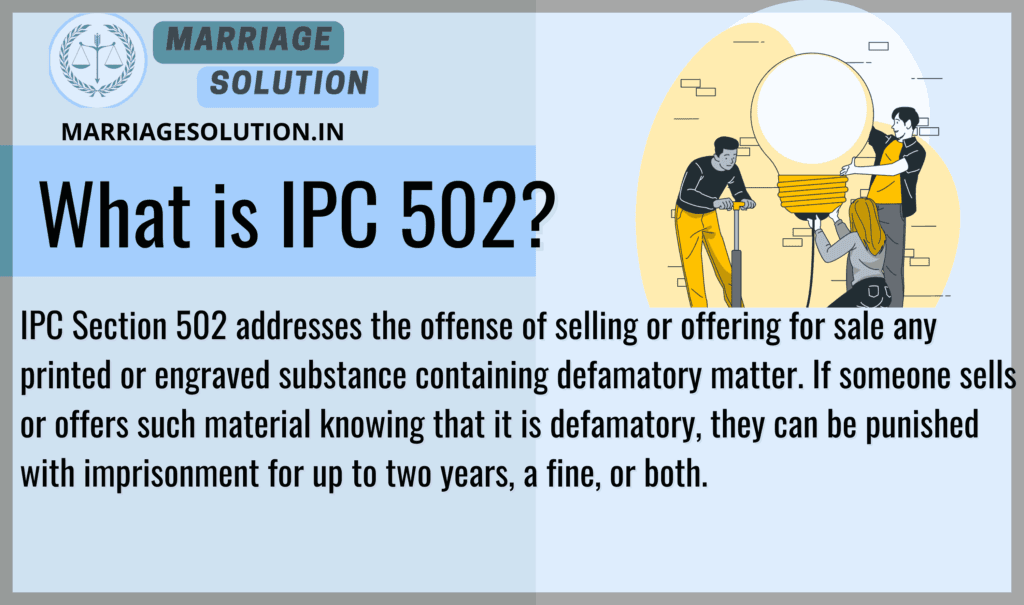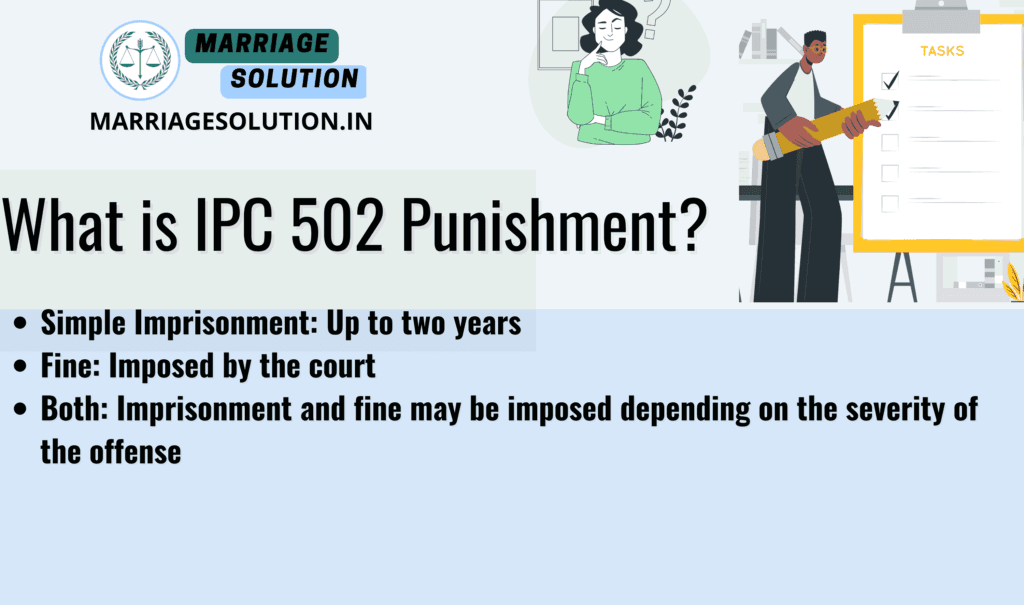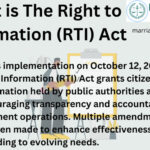Introduction of 502 IPC
IPC Section 502 aims to prevent the sale of printed or engraved material containing defamatory content. This law holds individuals accountable for knowingly selling such material, with penalties ranging from imprisonment to fines.
- Sale of Defamatory Material: IPC Section 502 addresses the offense of selling or offering for sale any printed or engraved substance containing defamatory content.
- Knowing Sale: It prohibits the sale of such material by individuals who know that it contains defamatory matter.
- Punishment: Offenders under IPC Section 502 may face simple imprisonment for up to two years, a fine, or both, as determined by the severity of the offense.
What is IPC Section 502 ?
IPC Section 502 addresses the offense of selling or offering for sale any printed or engraved substance containing defamatory matter. If someone sells or offers such material knowing that it is defamatory, they can be punished with imprisonment for up to two years, a fine, or both.

IPC Section 502 Overview
IPC Section 502 is about selling or offering to sell printed or engraved items that harm someone’s reputation. If someone sells such items knowing they are harmful, they can be jailed for up to two years or fined, or both.
IPC 502: 6 Key Points
- Selling Defamatory Items: This offense involves selling or offering to sell items that harm someone’s reputation.
- Knowledge of Defamatory Content: The person must know that the items they are selling contain harmful content.
- Defamation Defined: Defamation refers to saying or publishing things that damage a person’s reputation.
- Punishment: Punishment for IPC 502 can include imprisonment for up to two years, a fine, or both.
- Bailable Offense: This offense allows the accused to seek bail and be released from custody.
- Protecting Reputation: IPC 502 aims to protect individuals from harm caused by false statements, specifically in the context of selling printed or engraved items.
IPC 502 Punishment
- Simple Imprisonment: Up to two years
- Fine: Imposed by the court
- Both: Imprisonment and fine may be imposed depending on the severity of the offense

502 IPC bailable or not bailable ?
IPC Section 502 is considered a bailable offense, meaning that if someone is accused under this section, they have the right to seek bail as a matter of right. This allows the accused to secure their release from custody while awaiting further legal proceedings. Bail can be granted based on certain conditions set by the court, ensuring the accused’s appearance for trial.
Section 502 IPC in short information
| What is mean ? | IPC Section 502 |
|---|---|
| Definition | Selling or offering for sale printed or engraved substance containing defamatory matter. |
| Offense | Committing the act of selling or offering to sell such defamatory substances. |
| Punishment | Simple imprisonment for up to two years, or a fine, or both. |
| Bailability | Bailable – Accused has the right to seek bail as a matter of right. |
IPC Section 502 FAQs
What is the essence of the offense under IPC 502?
The essence of the offense under IPC 502 is selling or offering for sale any printed or engraved substance containing defamatory matter, while knowing that it contains such matter.
What is the maximum punishment for the offense under IPC 502?
The maximum punishment for the offense under IPC 502 is simple imprisonment for a term which may extend to two years, or a fine, or both.
Is the offense under IPC 502 bailable?
Yes, the offense under IPC 502 is non-cognizable and bailable, which means that the accused can claim the right to be released on bail as a matter of right.
What is the significance of the knowledge of defamatory content in the offense under IPC 502?
The offense under IPC 502 requires that the person knows that the printed or engraved substance they are selling or offering for sale contains defamatory matter, which makes the offense more serious.
What is the significance of the offense under IPC 502?
The offense under IPC 502 is aimed at protecting the reputation of individuals from false or malicious imputations that can damage their standing in society, specifically in the context of the sale of printed or engraved substances containing defamatory matter, which can have a wider reach and impact.
If you need support with court proceedings or any other legal matters, don’t hesitate to reach out for assistance.
Court or any other marriage-related issues, our https://marriagesolution.in/lawyer-help-1/ website may prove helpful. By completing our enquiry form and submitting it online, we can provide customized guidance to navigate through the process effectively. Don’t hesitate to contact us for personalized solutions; we are here to assist you whenever necessary!
- AFSPA Act
 AFSPA act mean Armed Forces Special Powers Act (AFSPA) grants special powers to the Indian Armed Forces in areas classified as “disturbed” due to significant insurgency or internal disturbances.
AFSPA act mean Armed Forces Special Powers Act (AFSPA) grants special powers to the Indian Armed Forces in areas classified as “disturbed” due to significant insurgency or internal disturbances. - Right to Information RTI act :Your Comprehensive Guide (Part 1)
 The Right to Information (RTI) Act : Explore the essence of the Right to Information (RTI) Act through this symbolic image. The image features legal documents, emphasizing the importance of transparency and accountability in governance. The scales of justice represent the balance achieved through the citizens’ right to access information.
The Right to Information (RTI) Act : Explore the essence of the Right to Information (RTI) Act through this symbolic image. The image features legal documents, emphasizing the importance of transparency and accountability in governance. The scales of justice represent the balance achieved through the citizens’ right to access information. - What is Article 371 of Indian Constitution ?
 Article 371 of the Indian Constitution grants special provisions to specific states and regions within India, addressing their unique historical, social, and cultural circumstances. These provisions aim to accommodate diverse needs and protect cultural identities within the constitutional framework.
Article 371 of the Indian Constitution grants special provisions to specific states and regions within India, addressing their unique historical, social, and cultural circumstances. These provisions aim to accommodate diverse needs and protect cultural identities within the constitutional framework. - Indian Labour law : Your Comprehensive Guide (Part 1)
 The purpose of labour laws is to safeguard employees and guarantee equitable treatment at the workplace, encompassing aspects such as remuneration, security, and perks. These regulations establish a secure ambiance by imposing minimum wage requirements, ensuring factory safety measures are implemented effectively while granting rights like maternal leave entitlements. Abiding by these principles promulgates an impartial work culture encapsulating upright conduct; thereby cultivating conducive surroundings for progressive development.
The purpose of labour laws is to safeguard employees and guarantee equitable treatment at the workplace, encompassing aspects such as remuneration, security, and perks. These regulations establish a secure ambiance by imposing minimum wage requirements, ensuring factory safety measures are implemented effectively while granting rights like maternal leave entitlements. Abiding by these principles promulgates an impartial work culture encapsulating upright conduct; thereby cultivating conducive surroundings for progressive development. - GST :Your Comprehensive Guide (Part 1 – Understanding the Basics)
 The Goods and Services Tax (GST) is like a big change in how we pay taxes in India. It started on July 1, 2017, and it’s here to simplify things. Before GST, we had many different taxes, and it could get confusing. Now, with GST, it’s like combining all those taxes into one. The idea is to make taxes more straightforward, clear, and fair for everyone. It applies to almost everything we buy or sell, and it’s helping India’s businesses and economy work better together. So, GST is not just a tax change; it’s a step towards making things simpler and better for all of us.
The Goods and Services Tax (GST) is like a big change in how we pay taxes in India. It started on July 1, 2017, and it’s here to simplify things. Before GST, we had many different taxes, and it could get confusing. Now, with GST, it’s like combining all those taxes into one. The idea is to make taxes more straightforward, clear, and fair for everyone. It applies to almost everything we buy or sell, and it’s helping India’s businesses and economy work better together. So, GST is not just a tax change; it’s a step towards making things simpler and better for all of us.
